#Classic SFF
Explore tagged Tumblr posts
Text
TBR TAKEDOWN: Week 8 (July 21)



TLDR: I have too many unread books, and I’m asking tumblr to help me downsize. Pick one or none, and comment if you can - a convincing sentence is worth a dozen votes! You’re also welcome to just choose the one that sounds the worst :D Book descriptions below the cut, see my pinned post for more info.
It’s a mass market SFF special this week!
The Elvenbane by Andre Norton & Mercedes Lackey
Two masters of epic fantasy have combined in this brilliant collaboration to create a rousing tale of the sort that becomes an instant favorite. This is the story of Shana, a halfbreed born of the forbidden union of an Elvenlord father and a human mother. Her exiled mother dead, she was rescued and raised by dragons, a proud, ancient race who existed unbeknownst to elven or humankind. From birth, Shana was the embodiment of the Prophecy that the all-powerful Elvenlords feared. Her destiny is the enthralling adventure of a lifetime.
The Lark & the Wren by Mercedes Lackey
With the proper schooling young Rune would be one of the greatest bards her world has ever seen. Even if only she knows it. Unfortunately, the daughter of a tavern wench at the Hungry Bear, no matter how talented, doesn't get much in the way of formal training. What she does get is frustrated.
One night, to back up a brag she probably wouldn't have made if she weren't so mad, she went up to play her fiddle for the Ghost of Skull Hill. Everyone knows that no one who has ever gone up Skull Hill has come down again. Not alive, anyway.
But when the ghost appears Rune strikes a bargain: if the ghost tires of her playing before morning her life is his; if he is still listening when the sun glints over yonder hill she will have earned both life and a sack of silver. Let the music begin...
PartnerShip by Anne Mccaffrey & Margaret Ball
She was born human... reborn as much, much more.
Her name was Nancia Perez y de Gras. Like the other five young people aboard, she was an aristocrat... a member of one of the illustrious High Families. And, like the others, she was a new graduate, just starting out on her own career.
But while the rest were bound for less-than-glamorous assignments—for reasons they preferred to conceal—on planets in a remote sector of the galaxy, Nancia was already on duty and proud of it: as a brain-ship for the Courier Service.
#I need y’all to tell me how terribly these have aged idk#tbr takedown#from instagram#bec posts#poll#book poll#book photo#anne mccaffrey#mercedes lackey#Andre Norton#Margaret ball#bardic voices#the elvenbane#partnership#sff#classic sff#booklr#books#bookish#bookblr#the lark and the wren
21 notes
·
View notes
Text
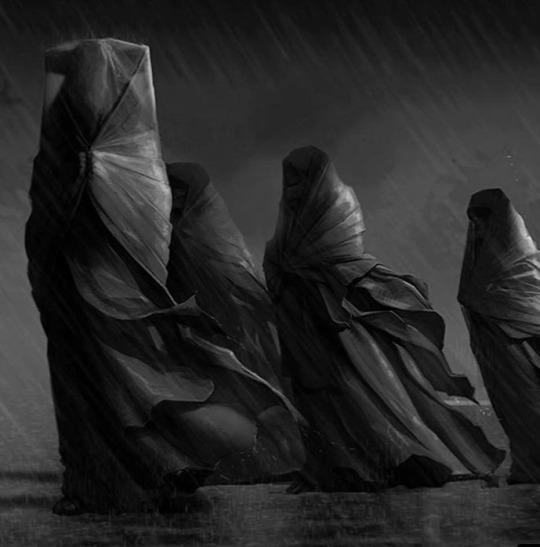

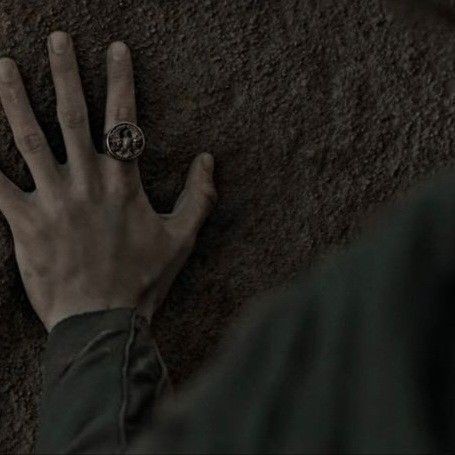


dune — playlist
#dune#frank herbert#playlist#spotify playlists#spotify playlist#book playlist#literature aesthetics#books#book#bookish#bookblr#bookworm#bookstagram#dark academia#booklover#scifi#science fiction#classic sff#studyblr#aesthetic#moodboard#edit#film#movie#denis villanueve#hans zimmer#timothee chalamet#zendaya#moon#dark aesthetic
125 notes
·
View notes
Text
The Warden Review: SFF Standards, Updated
The Warden Review: SFF Standards, Updated
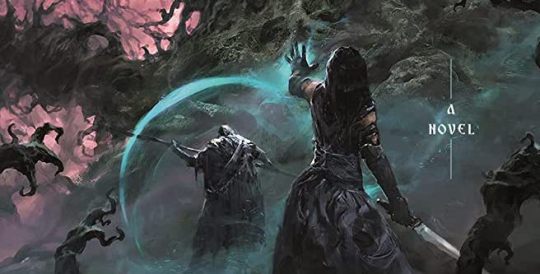
I am a sucker for fantasy adventure stories. I’m a sucker for necromancers as protagonists. Between all that and my considerable experience with the fantasy genre, The Warden by Daniel M. Ford seemed made for me. Though settling in was a little bumpy, once I was in I was hooked. Our protagonist Aelis is an …
2 notes
·
View notes
Text
Hot new hypothetical ethics question
If
1. The world-planning alien ocean you're studying creates a simulacrum of your dead ex-girlfriend from your memories of her
2. Said ex-girlfriend committed suicide after a very nasty breakup
3. But the simulacrums memories don't extend that far, and still thinks the two of you are in love
Then
4. Is it ethical to sleep with the simulacrum?
5. Is this a) xenophilia (alien construct), b) over-elaborate maturbation (she's formed entirely from your memories of the original) or c) just normal sex?
624 notes
·
View notes
Text
Rereading Shards of Honor once again, and knowing what I do about the SFF scene:
I suspect this book started as a novelette of just the Sergyar section, originally (Chapters 1-6) and LMB was encouraged to expand it. Which in hindsight we are all very thankful for, but the joins are there if I think to look for them.
#vorkosigan saga#it has the character of a classic SFF expansion of a set up scenario everyone loved
11 notes
·
View notes
Text


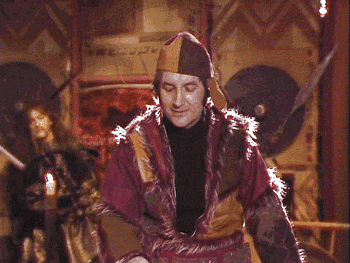





Endless list of favourite characters: VILA RESTAL (Blake's 7, Michael Keating, 1978-1981)
“Hello there. How are you? Excuse me wandering about your premises but I wonder if you can help me. I’m an escaped prisoner. I was a thief but recently I’ve become interested in sabotage, in a small way you understand, nothing too ambitious, I hate vulgarity, don’t you? Anyway, I’ve come to blow something up. What do you think will be most suitable?”
#tbs endless list of fave characters#gif#blake's 7#vila restal#michael keating#1970s#1980s#sff#my gifs#quotes#other people's property just comes naturally to me#i mean#it's vila#he's that classic sort of thief/coward/trickster/small man/jester character out of fantasy#landed in a terrible sff dystopia#and twisty and interesting like all the b7 characters#and if you hadn't already gathered that i'm always going to go for the magician-y/trickster/non-macho types#you have not been paying attention#(which is fair XD)#anyway#<3<3<3
116 notes
·
View notes
Text
I’m becoming Hyperion by Dan Simmons-pilled

‘confirmed by the All Thing’ more like. All the dialogue I needed to go apeshit
#field notes tag#genre enjoying#I’m so used to the “everyone must read” SFF Classics being hell to read but this book is Fun#it’s not like Dune. you can’t get higher praise from me than ‘not like dune’
2 notes
·
View notes
Text
too many people reblogging my popular posts methinks. time to post about the obscure homosexuals again
#if you don’t love me at my shitty microfandom yaoi meta you dont deserve me at my tlt funnyposting or whatever they say#(sorry moots. you will come out of this with a totally warped perception of classic sff books and you will LIKE it)
5 notes
·
View notes
Text

Okay putting this on my non-anon account because I'm THRILLED and also I guess I should share stuff I've got coming out and not just reblog grad school memes:
I HAVE A BOOK COMING OUT!
Andrion is the tale of Kallis "Andrion" of Athens, who fights against her father and the other orators for women's rights in Athens. She's ace and poly; the story is unashamedly queer, and so is the press.
It's about as close to historically accurate as you can get in a story with giant robots. I'm so fucking excited for this.
Anyway--Knight Errant's doing a Kickstarter for the 2023 catalogue, which I'll link in the next reblog, and the other two books this year also look amazing. We're all trans and queer. It's a micropress, but it's established with some great authors behind it. We've got almost 4.5k quid raised so far, including some funding from Creative Scotland--but we need 7k for full funding.
So if you want a copy, now's the time to order. ♥
Relevant links below!
#andrion novella#knight errant press#where to find my work#kickstarter#edinburgh#edinburgh press#scotland#scottish press#queer sff#sff#author tumblr#queer writers#queer fiction#trans authors#trans author#classics tumblr#classics author#ace rep
16 notes
·
View notes
Link
By Edan Lepucki
Octavia E. Butler published “Parable of the Sower” in 1993, when she was 46 and I was 12. I came to the book later than you might expect for an L.A. writer with a postapocalyptic novel of my own, but when I finally did, I was stunned. Here was a tale set in the world I knew in my darkest hours: the ravaged, water-starved, earthquake-ridden, fire-eaten Southern California that plays in my dreams, a vision of my dear, troubled homeland that will keep me up at night if I let it. This book — it was already in my bloodstream.
The story, which takes place in the now-uncomfortably-close 2024, is a string of diary entries written by a Black teenager named Lauren Olamina. She resides with her family in the fictional city of Robledo, 20 miles from the center of Los Angeles. Beyond the walls of her gated neighborhood roam violent thieves, feral dogs, illiterate water peddlers and addicts whose drug of choice makes them hungry for arson. When those walls are breached, most of the inhabitants killed for their property and possessions, Lauren flees. She disguises herself as a boy and, armed with the gun her preacher father taught her to shoot, joins the hordes of other migrants heading north on the 101 — on foot.
This is a future at once vivid and brutal, and it’ll scare you down to your scalp. How did Butler do it?
Perhaps it’s that the author — noted genius and inspiration for a thousand internet memes, with a middle school named after her and a new bookstore too — began as a daughter of Pasadena. She grew up in Southern California, as did I, and this place of sunshine and danger, with its attendant anxieties, must have imprinted on her, as it did on me.
But there’s more to it. A writer like Butler becomes iconic not only by reflecting our world and interrogating it but also by articulating our most profound truths. As I see it, Butler’s gift is naming vulnerability, exploring its burden and value.
In “Parable of the Sower,” Lauren is a “sharer,” meaning she suffers from a condition called “hyperempathy syndrome.” She can feel the pain and pleasure of others, and in this future there isn’t much pleasure to be had. For most of her life, Lauren kept her sharer status a secret because, as she tells it, “Being the most vulnerable person I know is damned sure not something I want to boast about.” As the story progresses, however, and she encounters the wider world, including her first sight of the Pacific Ocean, Lauren divulges her syndrome, her gift, to others.
She also tentatively shares the religion she is beginning to shape. For Lauren is also a prophet. She names her religion Earthseed, and in her journal entries we witness Lauren trying to make sense of it, to comprehend a system of meaning that she believes is already fully formed and simply waiting for her to bring it forth. Lauren isn’t the sloganeering prophet I’m used to; she is fumbling toward truth. Her vulnerability, no matter how burdensome, signifies hope. It is exhilarating and profound, and it’s what animates this dystopian novel.
For me, “Parable of the Sower” is a call to be daring in my fiction and to reside in feeling, to show characters revealing their most fragile selves — and at a high cost. What could be more dramatic? The question resonated as I wrote my forthcoming novel, “Time’s Mouth.” The book, like Butler’s, also takes place in California, and it’s also about a young woman with an exceptional way of experiencing the world — in this case, an ability to time travel to one’s own past. Butler’s novel led the way with its own wild premise, and it also taught me that a sensitive heroine must put herself at risk, must grapple to comprehend her gift, if her story is to feel consequential.
This is only one way my work is indebted to Butler, a writer who offered a terrifying vision of my hometown and showed a way forward — in fiction (and in the craft of fiction) if not in fact. Those who conjure frightening futures aren’t in the business of fortune-telling, only in the sharing of cautionary tales. I don’t want to find myself in the California of Butler’s imagination, as much as it might thrill, as easy as it is to picture. Thank goodness I can read it.
#books#reading#octavia butler#the parable of the sower#science fiction#scifi#sff#literature#classics
5 notes
·
View notes
Text
I massively recommend Tony Walker’s Classic Ghost Stories podcasts if you enjoy very well-read classic horror literature.
He’s also on YouTube, if you prefer that platform.
There’s so many excellent stories and excellent authors I would never have heard of without it, honestly.
I just listened to him reading Daphne Du Maurier’s absolute *classic*, The Birds, which I *massively* prefer to the film. It’s absolutely beautifully-done.
I have *always* thought Du Maurier was a fucking classic writer and every piece of hers I read confirms it. I read this when I was about 13, I think, when my school librarian said I was allowed to read any book from any shelf as long as I didn’t let anyone else know 😜 She had a soft spot for me because I kept taking out books no one else had taken out since the 1970s.
The only thing that surprised me about it was quite how *patriarchal* it was - that didn’t strike me when I was a kid. It’s still an incredible story, real classic apocalyptic SFF more than horror per se.
I seem to need audio a lot these days because fucking chronic fatigue means I only seem to be able to concentrate on extended reading when the hyperfixation stars align, even when I’m not in the level of chronic pain that my brain is screaming. I’m so bloody lucky that podcasts and Audible Plus exist.
I’m probably off my head for trying to do this masters degree with this level of impairment tbh, but I have managed so far. I hope I can keep managing.
#daphne du maurier#classic horror#classic horror literature#classic SFF literature#the birds#tony walker#I feel bad because I’m not super keen on his original work but I love how he reads#apocalyptic sff#podcasts#lit podcasts#audio#chronic illness#chronic pain#chronic fatigue
2 notes
·
View notes
Text
New on the blog - I've read a couple of excellent SFF books this year that combine science fiction and classic detective stories with iconic Hollywood film adaptations. Nick and Nora in space? Sam Spade versus superhumans? Yes, please!
0 notes
Text
#Book review#book blog#bookblr#books and reading#books and literature#sci-fi#sci fi and fantasy#scifi#fantasy#sci fi books#fantasy books#book review#book recs#book recommendations#books#reading#what i'm reading#sff books#sff#science fiction#science fiction and fantasy#science fantasy#Sentient Stars#Amber Toro#Self publishing#self pub#indie book#indie publishing#indie pub#classic sci fi
0 notes
Text
2024 Book Review #35 – To Say Nothing Of The Dog by Connie Willis
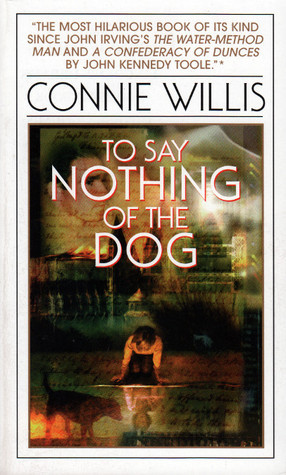
This was my second shot on reading something of Willis’, and I found it far more enjoyable than the first. Which is something of a feat, honestly – it’s a rare book that you can more-or-less accurately describe s a ‘cozy romcom’ that doesn’t make me recoil. But it was charming! And dated, but mostly only charmingly as well.
The story is the second in a series, which no one ever told me when recommending it because it does not matter in the slightest (at least, I had no issues at all following along with the story) – though it does mean that it hits the ground running and requires you to pick up quite a bit from context for the first while. It follows Ned Henry, a historian at the University of Oxford in the mid-21st century – a field that has been changed dramatically by the invention of time travel. For example, it’s suddenly in desperate need of particle-accelerator money, which is why and the entire rest of the department have been conscripted by an incredibly generous donor to help her reconstruct Coventry Cathedral exactly as it was before being destroyed in the Blitz. Exactly. ‘God is in the details’, and Henry has spent subjective weeks running himself ragged attending wartime rummage sales and sifting through bombed out ruins to try and verify the fate of a glorified flower pot mainly notable for being overdone and ugly even by Victorian standards.
After going through so many rapid-fire temporal shifts that the jump sickness leaves him waxing rhapsodic about the highway and falling in love with every woman he sees, he’s sent to Victorian Oxford to lay low and recuperate, and deliver a vitally important package to a contact already in situ. Unfourtunately that jump sickness means that he’s pretty unclear on the particular what and who. Really it’s remarkable that things don’t spin even more wildly out of control than they do (and there’s a period where he might have accidentally made the nazis win WW2).
So yeah, not what you’d call a serious novel. Most of the plot is sneaking around trying to make sure various members of the Victorian gentry fall in love in the right pattern to make sure someone’s grandson can fly in the RAF down the line and someone else elopes off to America on schedule (with drastically limited details and new information from back home changing things ever so often). Also sneaking a pampered rare-fish-hunting pet cat and slothful bulldog around before they arouse the wrath of their hosts. The apocalyptic threat that’s theoretically hanging over everyone never really feels real, and it’s all just pleasently absurd and enjoyable to read.
The comedy reminds me of early Prachett, in a way? Which like, a light comedy from the ‘90s in large part poking fun at English academia, of course there are similarities, but still. Not that that’s n insult. There’s plenty of absurd situations caused by miscommunication or desperately trying to work around absurd social conventions or personal foibles. Almost the entire Victorian cast (and a decent number of the present-day characters as well) are objectively ridiculous people, and the book has a lot of fun making do the literary equivalent of chewing scenery for the camera.
I call this a romcom, but I’m not ever sure that fits, honestly. It is a comedy with romance, between the two lead characters, whose dynamic with each other is the main throughline of the book. But it’s never really a source of drama? Or a motor of the plot. They are coworkers who end up working in close confines and get alone fine, who both awkwardly admit they find each other very attractive and start flirting and at the end they kiss and adopt a cat together. Least miscommunication- or conflict-ridden central romance in fiction you’ve ever seen. I don’t know enough about the genre constraints to determine whether it counts or not.
Part of the appeal of this was honestly the odd ways it came across as a bit dated? Not at all in a bad way but just, like – the fixation on the Blitz as the sine qua non of English history feels very 20th century? The references to the Charge of the Light Brigade and Schrodinger’s Box and Three Men in a Boat, combined with the felt obligation to step back from the narrative and explain what they were in case the reader wasn’t aware – just the idea that someone reading a time travel story won’t already be familiar with the concept of temporal paradoxes, really. It all added up to a reading experience that felt a bit off-kilter in a pleasing way.
This is obviously a story very fascinated by Victoriana – both the time period and the popular memory. Its perspective on the period is – I guess ‘affectionate contempt’ might be the best way to put it? It clearly doesn’t think much of the Oxfordshire gentry, the women shallow as a puddle and obsessed with marriage gossip and spiritualism, the men with their heads stuffed with some academic fixation and utterly divorced from all practical affairs, both obsessed with petty one-up-man-ship of their peers and casually abusive and callous towards the servants who run and organize their lives for them. But it all feels rather good-natured; not a trace of righteous fury or real class hatred is on display, the fact of the empire and the source of their fortunes is I think not even mentioned. One more way it feels a bit dated, I suppose, or maybe just a way my usual reading’s much more explicitly political about these things.
I’m also not sure if this is a matter of tastes or popular memory changing or just my impression of what the received common wisdom is being parochial or inaccurate, but – given the association of ‘Victorian’ with imperial grandeur, aesthetic superiority, eye-wateringly expensive historical real estate, etc, it is quite funny how the book takes for granted that to be ‘victorian’ means to be horrifically gaudy and over-designed, devoid of elegance or restraint, and to have probably ruined some real medieval beauty in its creation.
Anyway yes, you absolutely could dig into this book and write some meaty essays out of it, but I simply was not reading it closely enough to do so. It’s probably overlong and definitely meandering and unhurried, but I did find it a really enjoyable read.
50 notes
·
View notes
Text

🌟 Dive into the extraordinary at BayCon's Midnight Madness! 🌌 Every night at the Chaos Stage, we unleash a world of Pure Imagination with back-to-back cult film gems. ✨
Are you ready to explore the uncharted realms of fantasy and creativity? Join us at midnight, where the wonders of cinematic artistry await. 🎬 Let's celebrate the magic of the movies under the spell of the night sky! 🌜
Friday at 12am: Attack the Block (2011), followed by RoboCop (1984)
Saturday at 12am: John Carpenter's They Live (1988), followed by Shaun of the Dead (2004)
Sunday at 12am: Donnie Darko (2001), followed by Willow (1988)
#baycon2024#fan convention#sff fandom#pure imagination#midnight madness#cult classics#bay area#willow#robocop#attack the block#shaun of the dead#they live#donnie darko
0 notes
Link
By Edan Lepucki
Octavia E. Butler published “Parable of the Sower” in 1993, when she was 46 and I was 12. I came to the book later than you might expect for an L.A. writer with a postapocalyptic novel of my own, but when I finally did, I was stunned. Here was a tale set in the world I knew in my darkest hours: the ravaged, water-starved, earthquake-ridden, fire-eaten Southern California that plays in my dreams, a vision of my dear, troubled homeland that will keep me up at night if I let it. This book — it was already in my bloodstream.
The story, which takes place in the now-uncomfortably-close 2024, is a string of diary entries written by a Black teenager named Lauren Olamina. She resides with her family in the fictional city of Robledo, 20 miles from the center of Los Angeles. Beyond the walls of her gated neighborhood roam violent thieves, feral dogs, illiterate water peddlers and addicts whose drug of choice makes them hungry for arson. When those walls are breached, most of the inhabitants killed for their property and possessions, Lauren flees. She disguises herself as a boy and, armed with the gun her preacher father taught her to shoot, joins the hordes of other migrants heading north on the 101 — on foot.
This is a future at once vivid and brutal, and it’ll scare you down to your scalp. How did Butler do it?
Perhaps it’s that the author — noted genius and inspiration for a thousand internet memes, with a middle school named after her and a new bookstore too — began as a daughter of Pasadena. She grew up in Southern California, as did I, and this place of sunshine and danger, with its attendant anxieties, must have imprinted on her, as it did on me.
But there’s more to it. A writer like Butler becomes iconic not only by reflecting our world and interrogating it but also by articulating our most profound truths. As I see it, Butler’s gift is naming vulnerability, exploring its burden and value.
In “Parable of the Sower,” Lauren is a “sharer,” meaning she suffers from a condition called “hyperempathy syndrome.” She can feel the pain and pleasure of others, and in this future there isn’t much pleasure to be had. For most of her life, Lauren kept her sharer status a secret because, as she tells it, “Being the most vulnerable person I know is damned sure not something I want to boast about.” As the story progresses, however, and she encounters the wider world, including her first sight of the Pacific Ocean, Lauren divulges her syndrome, her gift, to others.
She also tentatively shares the religion she is beginning to shape. For Lauren is also a prophet. She names her religion Earthseed, and in her journal entries we witness Lauren trying to make sense of it, to comprehend a system of meaning that she believes is already fully formed and simply waiting for her to bring it forth. Lauren isn’t the sloganeering prophet I’m used to; she is fumbling toward truth. Her vulnerability, no matter how burdensome, signifies hope. It is exhilarating and profound, and it’s what animates this dystopian novel.
For me, “Parable of the Sower” is a call to be daring in my fiction and to reside in feeling, to show characters revealing their most fragile selves — and at a high cost. What could be more dramatic? The question resonated as I wrote my forthcoming novel, “Time’s Mouth.” The book, like Butler’s, also takes place in California, and it’s also about a young woman with an exceptional way of experiencing the world — in this case, an ability to time travel to one’s own past. Butler’s novel led the way with its own wild premise, and it also taught me that a sensitive heroine must put herself at risk, must grapple to comprehend her gift, if her story is to feel consequential.
This is only one way my work is indebted to Butler, a writer who offered a terrifying vision of my hometown and showed a way forward — in fiction (and in the craft of fiction) if not in fact. Those who conjure frightening futures aren’t in the business of fortune-telling, only in the sharing of cautionary tales. I don’t want to find myself in the California of Butler’s imagination, as much as it might thrill, as easy as it is to picture. Thank goodness I can read it.
0 notes